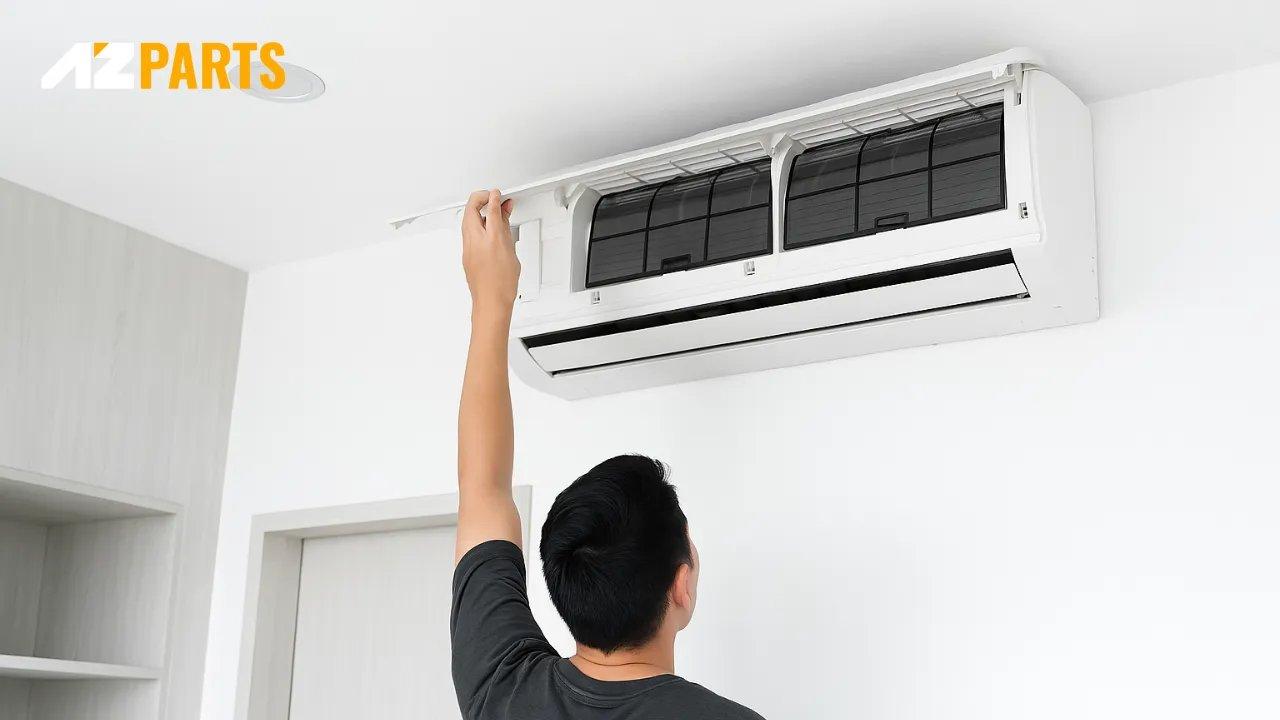Review
Difference Between Start Vs. Run Capacitor
AZparts Team
Updated on July 11, 2025
4 min read
Understanding the difference between a start capacitor and a run capacitor is key to keeping your air conditioner working efficiently. In this guide, AZParts breaks down what each capacitor does, how they work together, and when you should test or replace them. With the right knowledge, you can spot early warning signs and avoid unexpected breakdowns.

1. What does a capacitor do?
If you want to understand how your AC stays reliable, start by learning what a capacitor does. Here’s how start capacitors and run capacitors keep your system running efficiently:
1.1. Start Capacitors: Delivering the Startup Power
A start capacitor gives your AC motor the strong electrical boost it needs to start running. It sends a surge of energy to get the motor spinning quickly and stays active until the motor reaches about 75% of its top speed. Once that happens, the start capacitor switches off to prevent overloading and allows the motor to run smoothly on its own.
If you need a reliable start capacitor, AZParts provides quality options designed to deliver consistent startup power and help extend the life of your AC motor. Always check your system’s specifications before replacing to ensure a proper fit and safe installation.
Start capacitor gives motor the strong boost (Source: AZParts)
1.2. Run Capacitors: Supporting Ongoing Performance
Unlike start capacitors, run capacitors stay active the entire time your AC is running. After the start capacitor gets the motor going, the run capacitor keeps supplying steady power to maintain smooth and efficient operation. Its main job is to hold a continuous charge so your air conditioner stays reliable and runs at peak performance.
If your current run capacitor is wearing out, AZParts offers durable run capacitors designed for continuous operation, helping maintain your motor’s running speed and efficiency. Just remember to match your original specs and handle installation safely for the best results.
Run capacitors support ongoing performance (Source: AZParts)
2. How Both Capacitor Types Work Together?
Both the start capacitor and run capacitor work together to keep your AC system running efficiently. The start capacitor gives the motor a quick energy boost to get it moving, then the run capacitor takes over and supplies a steady flow of power to maintain smooth operation. Without this teamwork, the motor could overheat or fail, leading to poor performance and costly repairs. Together, they ensure your air conditioner starts easily and runs reliably.
3. Warning Signs Your Capacitor Needs Replacing
Paying attention to your AC capacitor parts can help you catch problems early and avoid expensive breakdowns. Here are some common signs that your air conditioner capacitors might need replacing:
- Sudden Increase in Energy Bills: If your energy costs jump unexpectedly, your AC may be overworking due to weak capacitors.
Weak capacitors increase energy bill (Source: Pinterest)
- Humming Noise: A constant humming sound usually means the capacitor is struggling to start the motor properly.
- Inability to Turn On: If your AC won’t start at all, a bad start capacitor could be the culprit.
- Unexpected Shut-Offs: When your unit turns off by itself, the run capacitor might be failing to maintain steady power.
- Burning Smell: Any burning odor signals possible electrical trouble, often linked to a failing capacitor.
If you notice any of these signs, call a trusted HVAC professional right away to inspect and replace faulty parts before they cause bigger damage.
4. How to Test an AC Capacitor with a Multimeter?
Knowing how to test your AC capacitor with a multimeter can help you catch problems before they damage your motor. Follow these key steps to check your capacitor safely and accurately:
- Turn Off the Power: Always shut off the power to your AC unit to avoid electrical shock.
- Locate the Capacitor: Find the start or run capacitor in your unit. Check the label for capacitance, voltage, and frequency values.
- Inspect for Damage: Look for signs of swelling, leaks, or corrosion on the capacitor casing.
- Discharge the Capacitor: Use an insulated screwdriver to safely discharge any stored electricity.
- Remove the Capacitor: Carefully disconnect the capacitor from the system.
- Set Up the Multimeter: Switch your digital multimeter to the capacitance setting (µF).
- Measure the Capacitance: Connect the multimeter probes to the capacitor terminals and compare the reading to the value on the label.
- Decide Next Steps: If the measured value is far from the rated value, replace the capacitor with one that matches the exact specifications.
Reading the value on the label correctly is important (Source: Freepik)
Understanding the difference between a start capacitor and a run capacitor helps you keep your AC system running efficiently and avoid unexpected breakdowns. Along with monitoring your capacitors, remember that other AC replacement parts like a port adapter or piercing valve also play important roles in proper system maintenance and refrigerant handling.
When it’s time to replace worn or faulty components, trust AZParts for reliable capacitors and quality accessories to keep your air conditioner performing at its best season after season.
Contact Information:
- Address: 8 The Green, Ste A, Dover, Delaware 19901-3618, United States
- Email: support@azparts.com
Air conditioner
Further Reading
Further Reading





